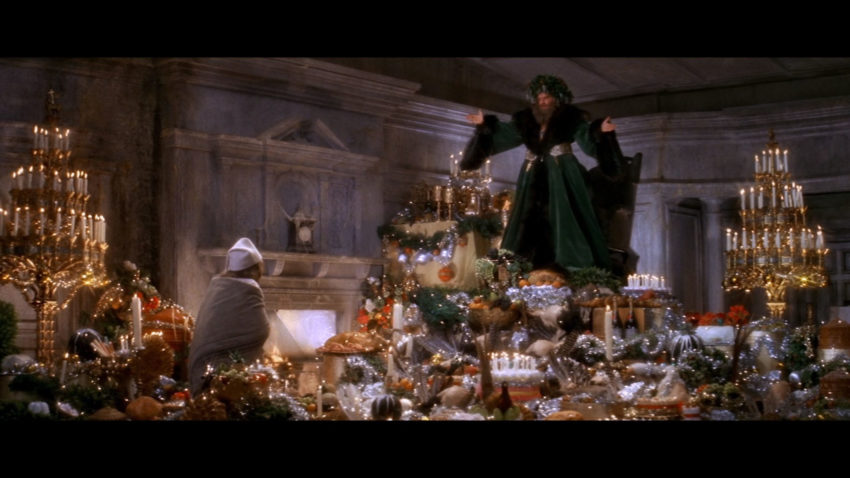
I grew up in a movie musical-loving household, so, naturally, our yearly dose of A Christmas Carol came in the form of Scrooge, the 1970 musical interpretation of Dickens’ holiday classic. While this version is my sentimental favorite, I concede that this adaptation makes a number of baffling decisions. For one, Scrooge was an obvious bid to capitalize on the success of 1968’s Oliver!, but none of the creatives involved with that project were involved with Scrooge. (It shows in the songs, which vary wildly in quality but nevertheless can’t manage to reach the heights of anything like “As Long as He Needs Me.”) Casting a then thirty-four-year-old Albert Finney—who can’t sing a note—as the titular old tightwad is another head-scratcher. (I love Finney’s ridiculous old man theatrics, but your mileage may vary.) The film’s most controversial choice might be in its third act, when the Ghost of Christmas Yet to Come goes a step further than usual and literally shows Scrooge his place in hell. (After this prophetic vision of eternal damnation, Scrooge’s decision to change his ways seems a bit more, uh, selfishly motivated.)
I will fiercely defend, however, the film’s unexpectedly breezy Ghost of Christmas Present.
In any version of A Christmas Carol, the Ghost of Christmas Present has one job: to get Ebenezer Scrooge to care one iota about his fellow man. The second spirit who appears to Scrooge espouses a philosophy of goodwill to all and promotes charity and unselfishness, challenging Scrooge to reevaluate his miserly outlook. This ghost is generally jovial and pleasant, until suddenly he isn’t. There often comes a point where the spirit drops the Father Christmas act to reprimand and shock Scrooge into thinking that maybe he should start giving a fig about someone other than himself.
I find myself indirectly chided and reproached by well-meaning people online for “not caring” about this or that every day. If you’ve ever used social media, you, too, might recognize some of the tactics that The Ghost of Christmas Present regularly uses for cajoling Scrooge into paying attention to and doing something about the ills of the world. Among other strategies, the second spirit pulls out:
- The “why is no one talking about this” tweet: The Ghost of Christmas Present assumes Scrooge’s ignorance of the degradations of poverty, showing Scrooge how the working-class lives in hopes of sparking a revelation.
- The heart-wrenching GoFundMe link for medical bills: The Ghost of Christmas Present tells Scrooge straight up that Tiny Tim will die if the old man doesn’t do something about it.
- The litany of dire predictions about the future: The Ghost of Christmas Present tries to scare the stuffing out of Scrooge by dramatically revealing the freaky allegorical waifs under his robe, Ignorance and Want, who will inherit the earth if no one practices Christian charity.
In Scrooge, the Ghost of Christmas Present is good vibes only. The ghost’s stern side never surfaces; Kenneth More infuses his incarnation of the second spirit with his signature blithe charm. If you don’t understand that life’s a romp—or a “perpetual spree,” as he sings—you’re doing it wrong, babe. Here I must confess that in my younger days, at the height of the YOLO craze, I once used a lyric from the Ghost of Christmas Present’s song, “I Like Life,” as an Instagram caption.
More’s Ghost of Christmas Present inspires goodwill towards men in Scrooge’s heart by getting Ebenezer lit. The two of them get drunk together, on the “milk of human kindness” that looks suspiciously like red wine. Then they fly off to invisibly attend a pair of Christmas parties. In remembering how wonderful and enjoyable life can be, Scrooge’s cold heart begins to warm, awakening a generosity of spirit.
Cheers to that. Admonishment, guilt, and fear only go so far as methods of persuasion when they become a constant barrage, even when I’m sympathetic to the causes being put forth. I’m not being the tone police here; I think righteous anger has its time and place. Sometimes we all need to be woken up a little bit, slapped like Bill Murray in Scrooged. But let’s be honest, if the Ghost of Christmas Present showed up at my door at two o’clock in the morning and started in with a talking-to, I think I’d just tune him out. Keep scrolling. I know the world sucks, what’s new.
My grandmother, who might easily be an antivaxxer and a Covid skeptic based on her preferred news sources, just got her booster shot the other week. When my mom thanked her for getting her vaccine and doing the right thing, grateful that it didn’t turn into a point of contention, my grandma texted back, “I love life too much to ever wager on giving it away!”
I like life / Here and now / Life and I made a mutual vow.
Life and I / ’Til I die / We’ll both try to be better somehow.
Perhaps More’s unrelentingly merry Ghost of Christmas Present is onto something. I like the idea of a “mutual vow” between life and I. It’s symbiotic, a give and a take. Getting high on life becomes an essential part of living a generous, open existence and remembering to love other people. I guess it seems kind of obvious, but, man, it’s been easy to hate people these last few years. I don’t need more reminders of how awful the world is right now. I need to be reminded of all of the wondrous things that make being alive so incredible, all of things that I want everyone in the world to have.
Like every good charity event planner, my favorite Ghost of Christmas Present knows that, sometimes, reaching this beatific state of generosity requires a few glasses of wine. And that’s okay.